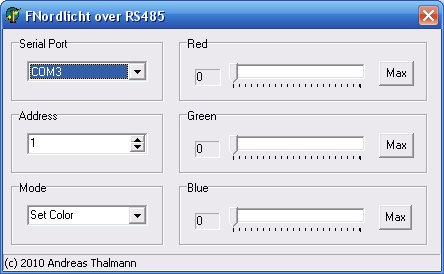RS485 vom PC aus
From Lochraster
Contents |
[edit] Einleitung
Die Firmware NG 0.2 (in C) hat eine RS485 Steuerung vorgesehen, die den MCPM-Mode des ATMega verwendet. Diese Mode interpretiert nur Pakete, die über den UART reinkommen, die das 9te Bit auf ein gesetzt haben, was die Prozessorlast mindert.
Vorbereitet sind einige Befehle:
- 0x01: Softreset
- 0x02: Set Color
- 0x03: Fade to color
Um RS485 nun von einem PC aus zu nutzen, um mehrere Fnordlichter zu steuern, muss man etwas Hardware basteln und natürlich dafür sorgen, dass der PC das richtige sendet.
[edit] Der RS485 Bus
Der Bus ist eigentlich recht simpel. ein 2-Draht Bus, der Vorne und Hinten eine 100Ohm (120Ohm) Terminierung benötigt und dazwischen Stichleitungen erlaubt. tbd: bild
[edit] Hardware
[edit] am PC
einen RS232 zu RS485 Wandler bauen. Da dies das "Vorne" ist, ist hier der 100Ohm (120Ohm) Abschluss notwendig. tbd: schaltung
[edit] am fnordlicht
Einen LTC 485 am Seriellen Eingang anbringen:
Pin LTC 485 <-> Fnordlicht 1 <-> RX 2 <-> GND 3 <-> GND 4 <-> TX 5 <-> GND 6 RS485 A 7 RS485 B 8 <-> +5V
[edit] Firmware
Hier muss nur RS485 aktiviert werden (config.h). Und jedes Licht benötigt eine eigene Adresse (Makefile: RS485_ADDRESS).
Ich habe aktuell auf 19200 Bd gewechselt, da dies beim Testen einfacher ist.
[edit] Software
Der knifflige Teil: wie bekomme ich aus einem PC-UART Protokoll 9N1 raus...?
Ich habe es mit dem Parity-Bit gelöst, das ich durch entsprechende Modeänderung immer auf den von mir gewünschten Wert bringe. Die statische Vergabe des Parity-Bit ist theoretisch (und sicherlich auch praktisch) möglich, erfordert aber direkten Zugriff auf das LCR des UART. Ich berechne also, ob ich eine gerade (even) oder ungerade (odd) Anzahl an Einsen im zu übertragenden Byte habe und dann setze ich entsprechen 8E1 oder 8O1 um am Schluss das passende Parity Bit zu bekommen.
[edit] Kurz und knapp das Programm (in C)
/* fnordRS485
Version: 0.1
Author: Christian Pohl
Date: 2009-05-12
*/
#include <stdio.h>
#include <string.h>
#include <unistd.h>
#include <fcntl.h>
#include <errno.h>
#include <termios.h>
#include <stdlib.h>
int openPort(char *port)
{
int fh; /* filehandle */
struct termios options;
fh = open(port, O_RDWR | O_NOCTTY | O_NDELAY);
if (fh == -1)
{
perror("openPort: Unable to open port");
return (0);
}
else{
fcntl(fh, F_SETFL, 0);
/* read current options */
tcgetattr(fh, &options);
/* in/out 19200bd */
cfsetispeed(&options, B19200);
cfsetospeed(&options, B19200);
/* Enable the receiver and set local mode */
options.c_cflag |= (CLOCAL | CREAD);
/* 8bit */
options.c_cflag &= ~CSIZE; /* Mask the character size bits */
options.c_cflag |= CS8; /* Select 8 data bits */
/* rts/cts to enable rs485 transmitter with rts */
options.c_cflag |= CRTSCTS;
/* one stop bit */
options.c_cflag &= ~CSTOPB;
/* enable parity */
options.c_cflag |= PARENB;
/* set new options */
tcsetattr(fh, TCSANOW, &options);
return (fh);
}
}
/* return 0 if even number of 1,
return 1 if odd number of 1 */
unsigned isOdd(unsigned char x)
{
x = x ^ (x >> 4);
x = x ^ (x >> 2);
x = x ^ (x >> 1);
return ((unsigned)(x & 1));
}
/* sendByte byte requires 9th bit (parity) to be parityBit
addrcmd: 9th bit must be 1
data: 9th bit must be 0
returns number of sent bytes (1 on succes, 0 on error) */
int sendByte(int fh, unsigned char byte, unsigned int parityBit) {
struct termios options;
tcgetattr(fh, &options);
/* precompute parity and set paritymode so that the paritybit will be parityBit */
if(isOdd(byte) != parityBit) {
options.c_cflag |= PARODD;
printf( "8o1\n");
}
else {
options.c_cflag &= ~PARODD;
printf ("8e1\n");
}
tcsetattr(fh, TCSADRAIN, &options);
return write(fh,&byte,1);
}
/* argv:
1 addr
2 cmd
3 data 1
4 data 2
5 data 3
6 ...
*/
int main(int argc, char *argv[]) {
int fh;
int i;
unsigned char addr;
if(argc<=2) {
printf("Usage:\n");
printf("%s address command [data1] [data2] ... \n",argv[0]);
printf("Address: 0-255 (0 is broadcast)\n");
printf("Command: 1 (softreset), 2 (set color, 3 databytes), 3 (fade color, 5 databytes)\n");
printf("All databytes: 0-255\n");
printf("No checks at all! Let's see what happens if you provide wrong data :-D\n");
exit(1);
}
fh=openPort("/dev/ttyS0");
if(fh == 0) {
exit(2);
}
addr = atoi(argv[1]);
printf("Sending to address %d\n",atoi(argv[1]));
if(sendByte(fh,addr,1)<=0) {
perror("error write addrcmd");
exit(3);
}
for(i=2;i<argc;i++) {
printf("Sending data: [%d]: %d\n",i-1,atoi(argv[i]));
if(sendByte(fh,atoi(argv[i]),0)<=0) {
perror("error write data");
exit(4);
}
}
close(fh);
exit(0);
}
[edit] Windows Programm
- Ansteuerung des FNordlichts über RS485 mit den Standardeinstellungen (9 Bit / 19200 Baud)
- Senden der 3 Standard Befehle (siehe oben)
- Download: FNordlicht over RS485
